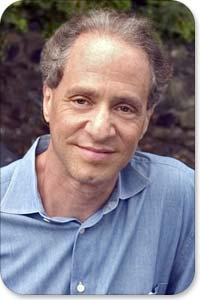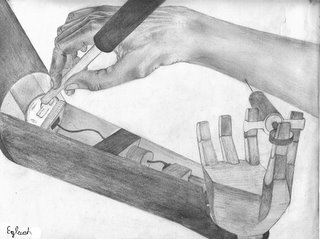
I've just read Ray Kurzweil's 1999 book, The Age of Spiritual Machines. This follow-up to his earlier volume, The Age of Intelligent Machines, attempts to predict what will happen if current technological trends continue for at least another century. Even though I'm predisposed to look favorably on the prospects, I found his conclusions challenging, not to say breathtaking.
And he's worth paying attention to. As an inventor who did seminal work on computer speech recognition, he knows what he's talking about. Many of his earlier predictions for the decade of the 1990's have turned out to be right on target.
He begins by presenting his theory of accelerating returns. The gist of this is that, having taken a long time to evolve, life took a much shorter time to develop intelligence; in less time than that, intelligent humans developed technology; and in less time than that the technology developed into computation. He makes a convincing case that evolution applies equally to social forms and to technology, and that once these things are set in motion they are destined to continue their development at ever increasing speed.
But you don't have to accept that there will never be a slowdown in technological development. If the current exponential rate of progress continues for only another few decades, computers will have vastly exceeded the storage capacity and computational ability of not only the human mind, but of ALL human minds put together. By this time they will be designing and building their own successors, and their role in our interdependent world will be so critical that it will no longer matter if they take over the world from us or not--we will be unable to live in it without them.
Those who doubt this have only to consider what would happen even now if all the computers in the world were suddenly absent or nonfunctional. Transportation, business, communication, government, weaponry, appliances, even the monetary system that supports our civilization in all its forms, all would collapse instantly. This was not true only 25 years ago; it will be vastly more true 25 years in the future.
Yet the picture Kurzweil paints is not bleak. Quite the contrary, the upside to this revolution/evolution could well be unprecedented prosperity, increased longevity and quality of life for all members of the human race, as well as their manufactured progeny.
But perhaps the most interesting part of all this is the question of what constitutes a "human being." When you look at our physical forms, it seems clear that we are not the stuff of which we are made. Our cells, and the atoms that comprise them, are constantly churning, constantly replacing and remaking themselves. The "us" in there is just a pattern, like the shape of our faces, passing through the world like a wave across the ocean.
How can we say that the pattern of consciousness must be limited to atoms arranged in a biological form and not a "manufactured" one? As we watch RNA molecules "manufacture" a new strand of DNA in our bodies, and as we contemplate building new structures at the molecular scale of nanotechnology, how can we define the difference, if there is one?
How we will feel when confronted by "manufactured" beings who claim to be equally conscious, and how we will define our own "humanity" in that situation, is a philosophical exercise we may as well start right now. It won't be long before we will need the answers.
Tuesday, January 10, 2006
Spiritual Machinery
Posted by
The Nort
at
6:27 PM
![]()
![]()
Labels: artificial intelligence, computers, Future, tech
Subscribe to:
Post Comments (Atom)









No comments:
Post a Comment